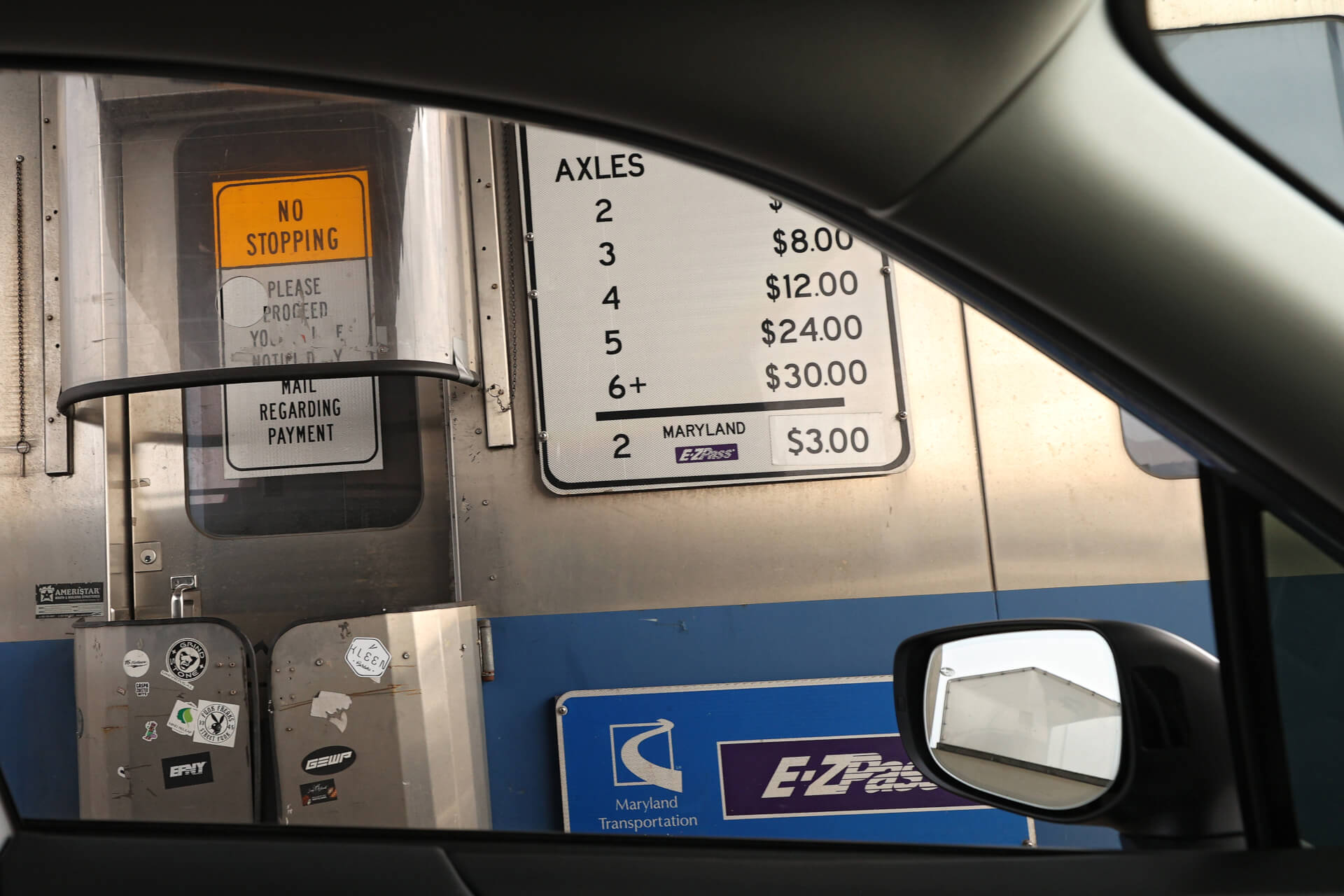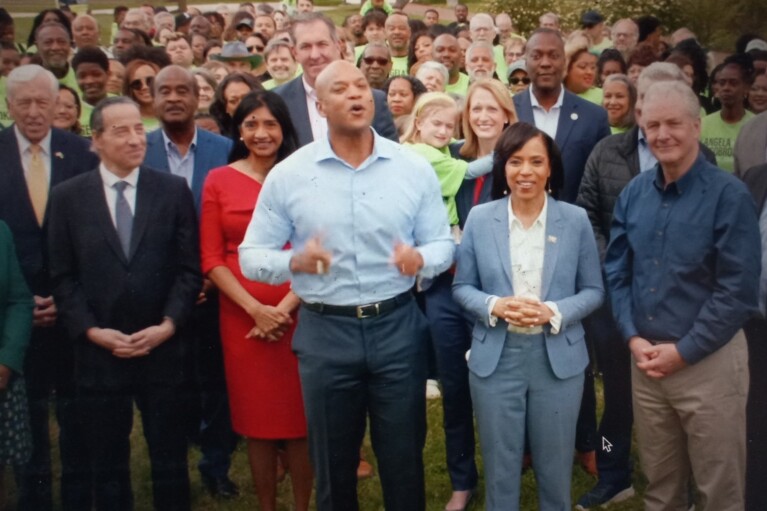Transportation commission to consider recommendations on tolls, vehicle fees

New fees for electric vehicle owners and increases in tolls are on the table as part of a set of interim recommendations due later this year from a blue-ribbon transportation panel.
The Transportation Revenue and Infrastructure Needs Commission will meet later this month. During that meeting — the final one of the year — the panel will consider at least three recommendations made by the commission’s chair, Frank Principe.
In an email, Principe said his recommendations to the panel represent an initial effort. The commission still has “a number of items outstanding from funding sources, to short– and long–term construction and maintenance funding, options for public–private partnerships, regional transportation authorities and options for improving the Maryland Department of Transportation’s ability and capacity to deliver major capital projects. As you can see there is no lack of work ahead of us.”
Included in the set of proposed recommendations is a call to authorize the state Motor Vehicle Administration to assess new fees on owners of electric and hybrid vehicles.
Another recommends that lawmakers “require the Maryland Transportation Authority to adjust toll rates to maximize toll revenue in order to generate additional revenues to help support Maryland’s broader transportation system.”
And a third calls on the state Department of Transportation to overhaul the process for setting a rolling six-year list of road and transit projects that local leaders and advocates and even some lawmakers say is often opaque, byzantine and increasingly antiquated.
Maryland, as with other states, faces the pressure of growing transportation needs and dwindling revenue.
The state’s Consolidated Transportation Plan, the six-year plan for new projects, is currently underfunded.
Transportation Secretary Paul Wiedefeld acknowledged a $100 million deficit in the coming fiscal year. The gap over the next six years is expected to top $2.1 billion.
Legislative budget analysts, in a recent report, note a 10-year shortfall of nearly $4 billion.
Members of a House Appropriations subcommittee expressed frustration earlier this year over the unbalanced transportation budget plan. It is the first time the department has delivered an unbalanced plan in the document’s history.
“MDOT is required to submit the final CTP to the legislature in mid-January, but we expect to provide additional information on what that final CTP will look like in the coming weeks,” Wiedefeld said in an email response to questions.
But the timeline raises concerns among lawmakers about draconian cuts delivered a month before the start of the 2024 session.
Earlier this year, the General Assembly created the commission. Its task over its 16-month run includes making recommendations to stabilize funding for state transportation projects and modernize the Consolidated Transportation Plan.
The interim report due to lawmakers at the end of the year represents just four months of work. The group will meet for another year. A final report is expected to make broader policy and revenue recommendations.
None of the recommendations in the five-page document circulated among the 31-members of the commission are surprising based on the panel’s meetings over the last four months.
In fact, each recommendation is pulled from briefings during the panel’s three previous meetings.
The commission is tasked with recommending ways to modernize how the state selects and pays for building and maintaining its road and transit networks.
Currently, those projects are paid for through the state’s Transportation Trust Fund.
Motor fuel and new vehicle taxes as well as vehicle registrations represent a significant part of the money that flows into that dedicated account.
That fund is increasingly overburdened.
Fuel sales in Maryland are on the decline. Some of the decline is the result of sales of vehicles with increased fuel efficiency.
Industry experts told the commission that the state may have reached “peak fuel” sales. The expected decline means a commensurate decrease in state fuel tax collections.
“The decrease in revenue from the motor fuel tax is a reality for the trust fund,” according to Principe’s memo to the commission.
Also hurting the fund is a decrease in new vehicle titling taxes as people keep their cars longer.
The move to electric and hybrid vehicles exacerbates the strain on the fund.
The heavier vehicles cause more wear and tear on roads. Owners, however, do not pay into the fund through fuel taxes.
Maryland ranks 12th in the country in the number of electric vehicles per 1,000 people.
Registration of those vehicles in the state is expected to increase in the coming years.
Earlier this year, Gov. Wes Moore (D) said all new car sales in Maryland by 2035 must be electric vehicles.
In 2022, there were more than 900,000 electric and hybrid vehicles registered in Maryland. The state is on pace to hit 1.3 million electric and hybrid vehicles this year.
A fee on those vehicles, if authorized by the General Assembly, would mean owners would pay into the trust fund beyond sales tax and registration fees.
Principe’s recommendation is silent on an amount, but the commission was briefed on fees charged in other states.
The MVA provided models of potential fees to the commission, though none would sufficiently offset decreases in gas tax collections.
“I don’t think the fees being talked about equate to a perfect one to one gas tax,” said commission member Del. Marc Korman (D-Montgomery), who is also the chair of the House Environment and Transportation Committee.
The average electric vehicle fee is $128 in other states, while the average hybrid vehicle fee is $63.
“…I don’t particularly enjoy putting fees or taxes on people, but I also don’t enjoy trains derailing and potholes forming,” said Korman.
The proposal for such a fee may meet with some bipartisan support.
Senate Minority Leader Stephen S. Hershey Jr. (R-Upper Shore), also a member of the commission, said such a fee would be more equitable than relying solely on drivers of gas-powered vehicles.
“I think it’s something everybody can be on board with now,” said Hershey.
Additionally, Principe will ask the commission to approve a recommendation to increase tolls on out-of-state drivers.
A review by the Department of Legislative Services found that an increase of 50-cents on all out-of-state drivers would yield nearly $27 million in additional revenue annually. That same increase on all vehicles would generate $81 million.
Principe said the state “should generally maximize toll rates and that’s an option.”
Principe’s recommendation holds out the possibility that some of the money, above that which is needed to pay bonds on toll facility projects, could be funneled into the trust fund for other projects. That represents a shift in current policy.
Raising tolls, either across the board or on out-of-state drivers, comes with a set of potentially complicating political and legal factors.
Former Gov. Larry Hogan (R) lowered tolls during his eight years in office. Mileah Kromer, a pollster and political science professor at Goucher College wrote in a recent op-ed that Hogan owes some of his popularity over those eight years to the cuts.
Kromer, in an interview, said the Moore administration could avoid political blowback if the increases were charged to non-Maryland drivers.
“If you’re going to have to raise tolls, that’s the way to do it,” said Kromer. “It’s Marylanders’ pocketbooks that the governor should be the most concerned about.”
Kromer said an increase on out-of-state drivers is “something I think would certainly go over much better with Marylanders than an across-the-board increase because it’s not an additional expense they would be incurring.”
The legality of tolls levied on out-of-state drivers is a matter of debate.
In Rhode Island, a federal judge declared unconstitutional a plan to charge tolls to out-of-state truckers while exempting state businesses and cars registered in the state. The state has appealed the ruling and is awaiting a decision by the First Circuit Court of Appeals.
Additionally, it is unclear if part of any toll increase could be legally siphoned off into the trust fund. Currently, tolls collected by the Maryland Transportation Authority are specifically dedicated to pay off the bonds used to fund toll facility projects.
Wiedefeld, in an email, suggested the state might be able to avoid legal entanglements by charging higher fees to motorists who register their E-ZPass accounts outside of Maryland.
“The Maryland Transportation Authority currently offers discounts of 25% or more for drivers with the Maryland E-ZPass account,” Wiedefeld wrote. “Although the majority of Maryland E-ZPass account holders are Maryland residents, the Maryland E-ZPass program is open to residents of any state.”
A letter from the Office of the Attorney General said that any change would likely require legislation and “the constitutionality of any proposal will turn on the specific details.”
“As you have seen from the AG’s letter on this topic there is confidence that the tolls could be used for other projects,” Principe said. “I have confidence that the AG’s office believes we can move forward with this idea, but I will also acknowledge that there are expressed concerns that will need attention as this topic advances.”
Principe’s final proposed recommendation calls for a revamping of the Consolidated Transportation Plan.
“The current process lacks consistency and uniformity and can be improved to promote fairness,” Principe wrote in his memo.
But the chair added the commission was “not comfortable” recommending specific changes.
During the Hogan administration, the legislature attempted to impose a scoring system that could be used to prioritize projects. Hogan and some local leaders balked, saying such a system could potentially funnel most if not all transportation funding into larger counties.
Korman said it is likely the legislature will again look at some form of scoring system in the coming legislative session.
“I think people would like to see a statutory process,” said Korman.




 Creative Commons Attribution
Creative Commons Attribution